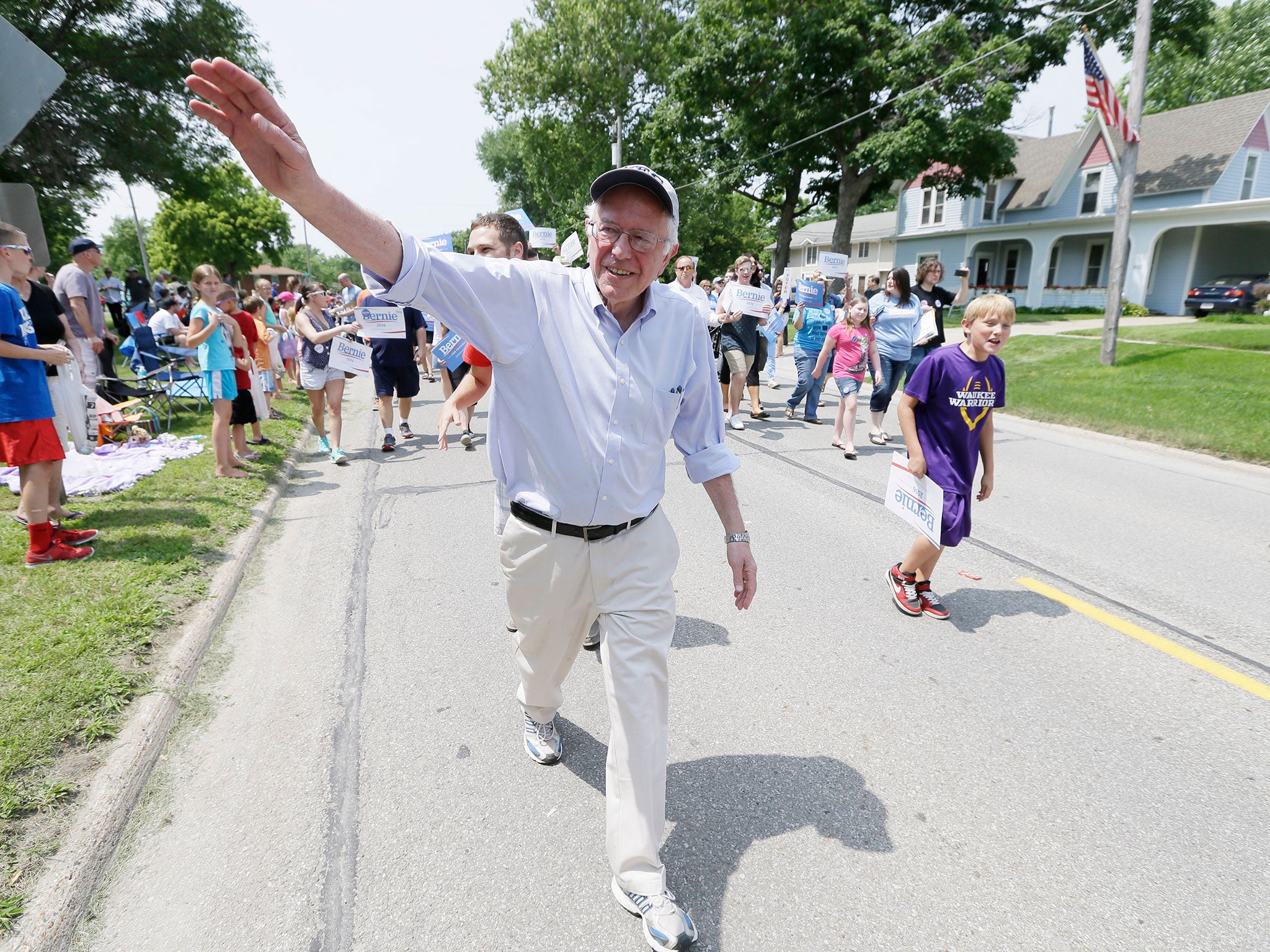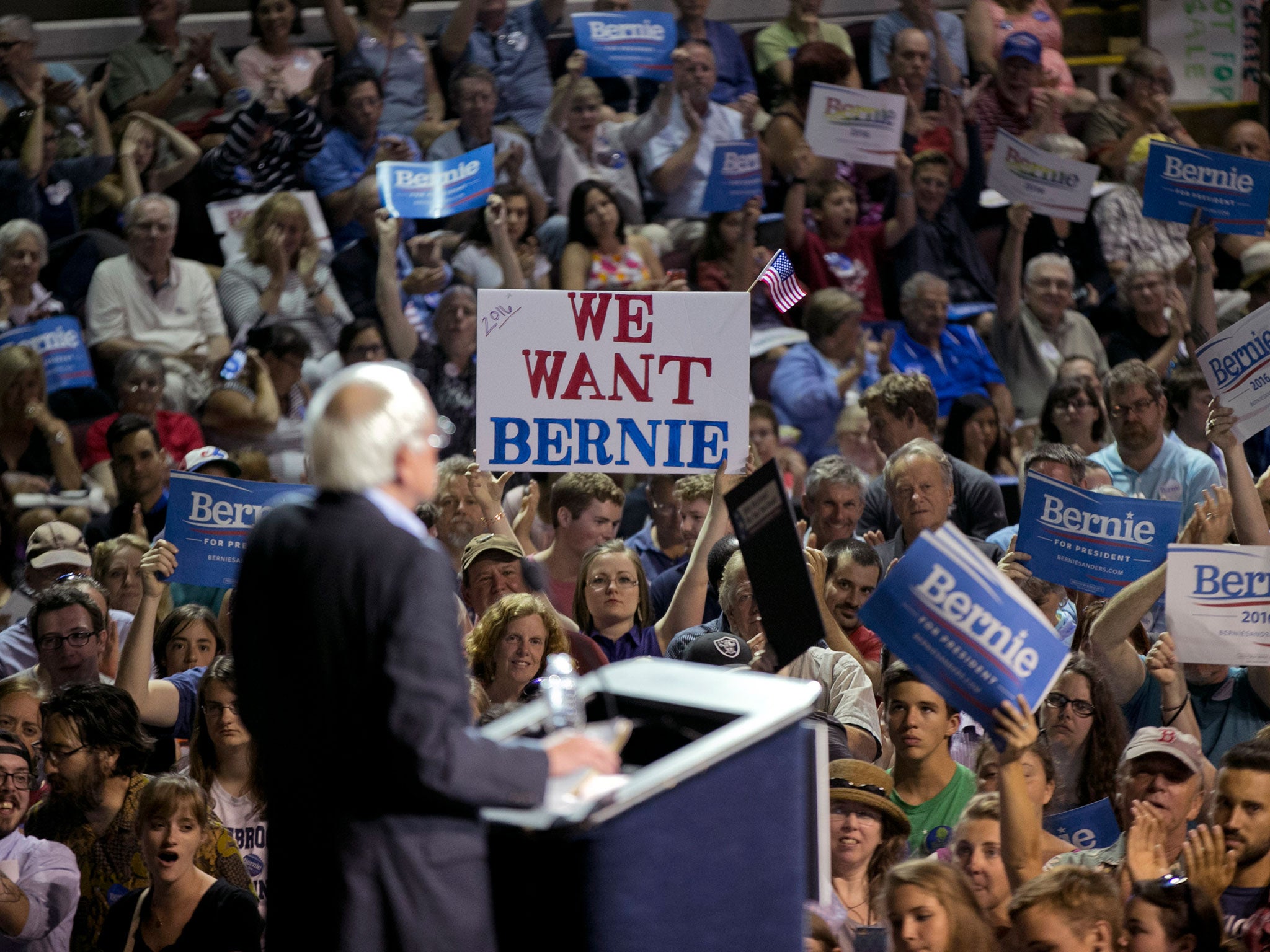US Presidential campaign 2016: Bernie Sanders - the socialist Senator going after billionaires and mega-banks - and garnering widespread support
Mr Sanders is saying things that other Democrat candidates for the White House don't dare – and, what's more, he's catching rival Hillary Clinton fast

Bernie Sanders doesn’t kid around a lot, but having fluffed one of his applause lines on the stump, he allowed himself a chuckle. It wasn’t the line about going after billionaires or getting their money out of politics. Or the one about opposing free trade or switching to an NHS-style single-payer system for healthcare. It was about smashing the mega-banks that got taxpayer bailouts not long ago.
“If that bank is too big to exist, that bank…” Cue the only pause in an hour-long rhetorical thunder-roll delivered without autocue. “I got that wrong. If that bank is too big to fail, that bank is too big to exist.” Mr Sanders, the independent US Senator from Vermont who is seeking the Democrat 2016 nomination, needn’t have worried. No one could possibly have mistaken where he was coming from. The left.
The whole country is starting to find out. After launching what most in the political establishment considered an eccentric and quixotic bid to outrun Hillary Clinton for the Democratic nod in next year’s election, Bernie – his chosen campaign identity – is catching fire. Never mind that he’s 73 years old and identifies himself as a “democratic socialist”. Socialism and American politics don’t usually go together.
The evidence is in the numbers. It was Monday evening and an astonishing crowd of 7,500 had funnelled into the Cross Arena in Portland to see him, a bigger crowd than Ms Clinton got at her first big rally in New York last month or Jeb Bush managed for his official announcement in Miami. It has been like that everywhere. A Sanders rally in Wisconsin last week drew nearly 10,000 people. When 2,500 came to see him in Council Bluffs, Iowa, a few days ago, it set a record in that state for this election cycle.
His polling has seen distinct movement too, notably in the states that will set the pace in the nominating process early next year. A CNN poll in New Hampshire shows Mr Sanders just eight points behind Ms Clinton. In Iowa, he is 19 points behind her, according to a Quinnipiac survey. But in May, the gap was 45 points, so he is catching up fast. The other thing telling us to pay attention is that the Clinton campaign is paying attention.
“We are worried about him, sure. He will be a serious force for the campaign, and I don’t think that will diminish,” Jennifer Palmieri, the Clinton campaign’s communications director, admitted to an interviewer on MSNBC this week. That Senator Sanders is pitching himself as the real progressive choice for Democrats has apparently started to get under Ms Clinton’s skin.

“I take a backseat to no one when you look at my record in standing up and fighting for progressive values,” she declared at a rally in Hanover, New Hampshire, last weekend. Asked later about Mr Sanders’ apparent surge, she offered: “We each run our own campaigns and I always knew it would be competitive. I want to have free debate in the primary and caucuses around the country.”
Senator Sanders, rumpled and stern, faces huge hurdles. He vows to refuse billionaire donations, a stand that delighted the crowd here, but which will put him at a disadvantage in a race where money obviously does matter. Last week his campaign said it had raised $15m (£9.7m) since April through small donations averaging $35 from about 250,000 people – a decent number that also speaks to the grassroots groundswell he is creating. But Ms Clinton raised a handier $45m.
And he lacks the caution of most politicians, itself central to his appeal. “I think he just speaks from the heart,” noted Alida Duncan, 32, who had driven to Portland from Vermont where she has known the Senator “all my life”. To his fans, Bernie is the genuine article, without the artifice of Ms Clinton.
As he scrolled through the issues that ignite him – all under the theme of restoring the balance between the very rich and everyone else – Mr Sanders hailed his own bluntness. “Let me not equivocate, let me be as clear as I can be, because we are going to send a message to the billionaire class and that message is: ‘You can’t have it all!’” he blasted. “You can’t get huge tax breaks, when children in America go hungry… Your greed has got to end and we are going to end it for you!”
He promised that as president his first pick to join the Supreme Court would first have to undertake publicly to undo Citizens United, the Court’s 2010 ruling that essentially lifted the last limits on the very rich using their fortunes to assist candidates they like. In this, he singled out the industrialists David and Charles Koch, who reportedly plan to spend as much as $1bn supporting their favoured Republican runners. (For the Kochs and their allies a Sanders presidency would seem akin to Earth exploding.)
“What you are looking at is not called democracy. It is called oligarchy and we are going to end that,” he declared here, sending the crowd once more into a foot-stamping chorus of “Bernie! Bernie”. He went on: “The United States and our government are not for sale!”
Unlikely as his candidacy sounds, this could be Mr Sanders’ moment, even if at the end of the day it’s limited to pulling Ms Clinton leftwards. It would be a happy culmination of a decades-long political career that began when as a young man he left his native Brooklyn for Vermont, where in 1971 he joined the Liberty Union Party, a movement born out of the anti-war fervour of those years. It was in Vermont, a liberal bastion still today, that in 1981 he was elected Mayor of Burlington, its biggest city, on a leftist platform, and thereafter to the US Congress in 1990 and the US Senate in 2006.
It is his moment because liberals in the Democratic Party are sceptical of the progressive bona fides of Ms Clinton, who has padded her own pockets with exorbitant speaker’s fees and played footsie with big donors and Wall Street. And because, as he told the overflow crowd here, the income and wealth gap in America is set to become one of the most debated issues of the coming campaign.
It is no surprise his rallies are packed, he declared. “The answer, I think, is pretty obvious. From Maine to California… the American people understand that establishment politics and establishment economics are not working for the middle class.”
He went on: “They understand that the greed of Wall Street and the greed of corporate America is destroying the great middle class of this country and people are saying from coast to coast, ‘You can’t keep getting away with that’. And people understand that it is not acceptable that a handful of billionaires are now controlling our political process.”
It is hardly clear whether Mr Sanders, with his unapologetically leftist pitch, can stop the Clinton train, let alone persuade the whole country to put him in the White House. But some here are starting to dream. “At first I thought he just wanted to influence the conversation,” offered Ms Duncan, whose drive from Vermont had taken four hours. “But with these big crowds, I think he might really make it.”
Radical wish list: Sanders’ pledges
- Raise taxes on the rich and on corporations, closing all loopholes.
- Expand Obamacare into a European-style, single-payer system, where every American would qualify for Medicare, currently only available for the over-65s.
- Introduce obligatory paid sick and holiday leave, including 12 weeks paid maternity/paternity leave.
- Offer free tuition in public colleges and universities, funded by “speculation tax”, essentially a Wall Street levy.
- Bring back public funding for elections, like in Britain.
- Put a break on all future free trade deals.
- Introduce a federal minimum wage of $15 an hour and end the pay gap between men and women.
Join our commenting forum
Join thought-provoking conversations, follow other Independent readers and see their replies
Comments